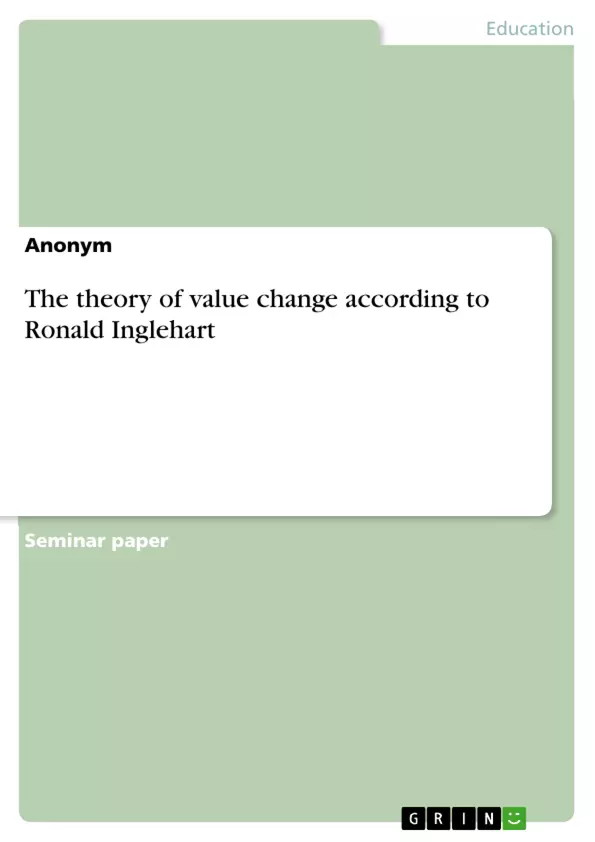Since industrialization, technological, scientific and cultural changes have been taking place in the Western world at breakneck speed. This development has had a very strong impact on the subjective worldview of the citizens of the Western world. In the 1960s, post-industrial nations experienced a real breakout from traditional values and behavior patterns (e.g., "hippie movement," "68ers," "no-war movement," demonstrations for greater equality...). These changes in the subjective measurement of values have continued, albeit not in such a radical form, and are often referred to as "value change."
Table of Contents
- 1. Introduction
- 2. Norms, values, change of values
- 3. The theory of value change according to Inglehart
- 4. Materialism vs. Postmaterialism
- 5. Influence of the change in values on political participation
- 6. Assessment
- 7. Conclusion
Objectives and Key Themes
This work aims to explain the societal value shifts observed in post-industrial Western nations since the 1960s using Ronald Inglehart's theory of value change. It will analyze Inglehart's distinction between materialism and postmaterialism and explore the implications for political participation.
- The concepts of norms, values, and value change
- Inglehart's theory of value change: materialism vs. postmaterialism
- The causes and manifestations of value change in Western societies
- The impact of value change on political participation
- Critical assessment of Inglehart's theory
Chapter Summaries
1. Introduction: This introductory chapter sets the stage by highlighting the rapid technological, scientific, and cultural transformations in the Western world since industrialization. It emphasizes the profound impact these changes have had on the subjective worldview of Western citizens, particularly the shift away from traditional values in the 1960s, exemplified by movements such as the "Hippie Movement" and anti-war protests. The chapter establishes the work's central focus: explaining these value changes using Inglehart's theory, clarifying the concepts of norms and values, and analyzing the theory's implications for political behavior in post-industrial societies. It lays out the structure of the paper, promising to define key terms, present Inglehart's hypothesis, examine the causes of value change, and assess its impact on political participation.
2. Norms, values, change of values: This chapter delves into the fundamental concepts underpinning Inglehart's theory. It begins by defining "norms," drawing on Bahrdt's work to establish their relationship to values and their role in creating social order and predictability. The chapter then tackles the complex and inconsistently used term "value," exploring various definitions from scholars like Kluckhohn and Pappi to arrive at a working definition suitable for the analysis of Inglehart's theory. The chapter emphasizes the distinction between values, desires, and needs, a crucial element for understanding Inglehart's framework. Finally, it addresses the concept of "value change," outlining definitions from Häberle and Pappi, and highlighting Meulemann's emphasis on the interconnectedness of values and the growing importance of self-determination. The chapter closes by introducing Inglehart's theory as a prominent and often debated framework within social sciences.
Keywords
Value change, Inglehart's theory, materialism, postmaterialism, norms, values, political participation, Western societies, post-industrial societies, cultural change, social values, self-determination.
Frequently Asked Questions: A Comprehensive Language Preview
What is the main topic of this text?
This text provides a comprehensive overview of Ronald Inglehart's theory of value change, focusing on the shift from materialism to postmaterialism in post-industrial Western societies since the 1960s and its impact on political participation.
What are the key themes explored in this text?
The key themes include the concepts of norms and values, Inglehart's theory of materialism vs. postmaterialism, the causes and manifestations of value change in Western societies, the impact of value change on political participation, and a critical assessment of Inglehart's theory.
What is Inglehart's theory of value change?
Inglehart's theory posits a shift from materialist values (emphasizing economic and physical security) to postmaterialist values (prioritizing self-expression, quality of life, and participation) in post-industrial societies. This shift is attributed to changes in societal conditions and the relative scarcity or abundance of basic needs.
How does this text define "norms" and "values"?
The text draws upon various scholarly sources to define "norms" as rules governing behavior that contribute to social order and predictability, and "values" as broader beliefs and principles that guide individual choices and priorities, distinguishing them from desires and needs. The definitions are refined for the specific analysis of Inglehart's theory.
What are the chapter summaries provided in this text?
The text offers summaries for each chapter. Chapter 1 introduces the context of value change in post-industrial societies. Chapter 2 defines key concepts like norms, values, and value change. Subsequent chapters delve into Inglehart's theory, its implications for political participation, and a critical assessment.
What is the impact of value change on political participation, according to this text?
The text explores how the shift from materialist to postmaterialist values influences political participation. It examines how changing priorities might affect engagement in political processes and the types of issues prioritized by citizens.
What is the conclusion of this text?
While a full conclusion isn't detailed in the preview, it is implied that the text offers a critical analysis of Inglehart's theory within the context of value changes observed in post-industrial Western societies and their impact on political participation.
What are the keywords associated with this text?
Keywords include value change, Inglehart's theory, materialism, postmaterialism, norms, values, political participation, Western societies, post-industrial societies, cultural change, social values, and self-determination.
What is the purpose of this text?
The purpose is to explain societal value shifts using Inglehart's theory, analyzing the materialism/postmaterialism distinction and its implications for political participation in post-industrial Western nations.
Who is the intended audience for this text?
The intended audience appears to be academic, given the structured and analytical approach, the inclusion of scholarly sources, and the focus on theoretical frameworks.
- Quote paper
- Anonym (Author), 2010, The theory of value change according to Ronald Inglehart, Munich, GRIN Verlag, https://www.grin.com/document/1222890



